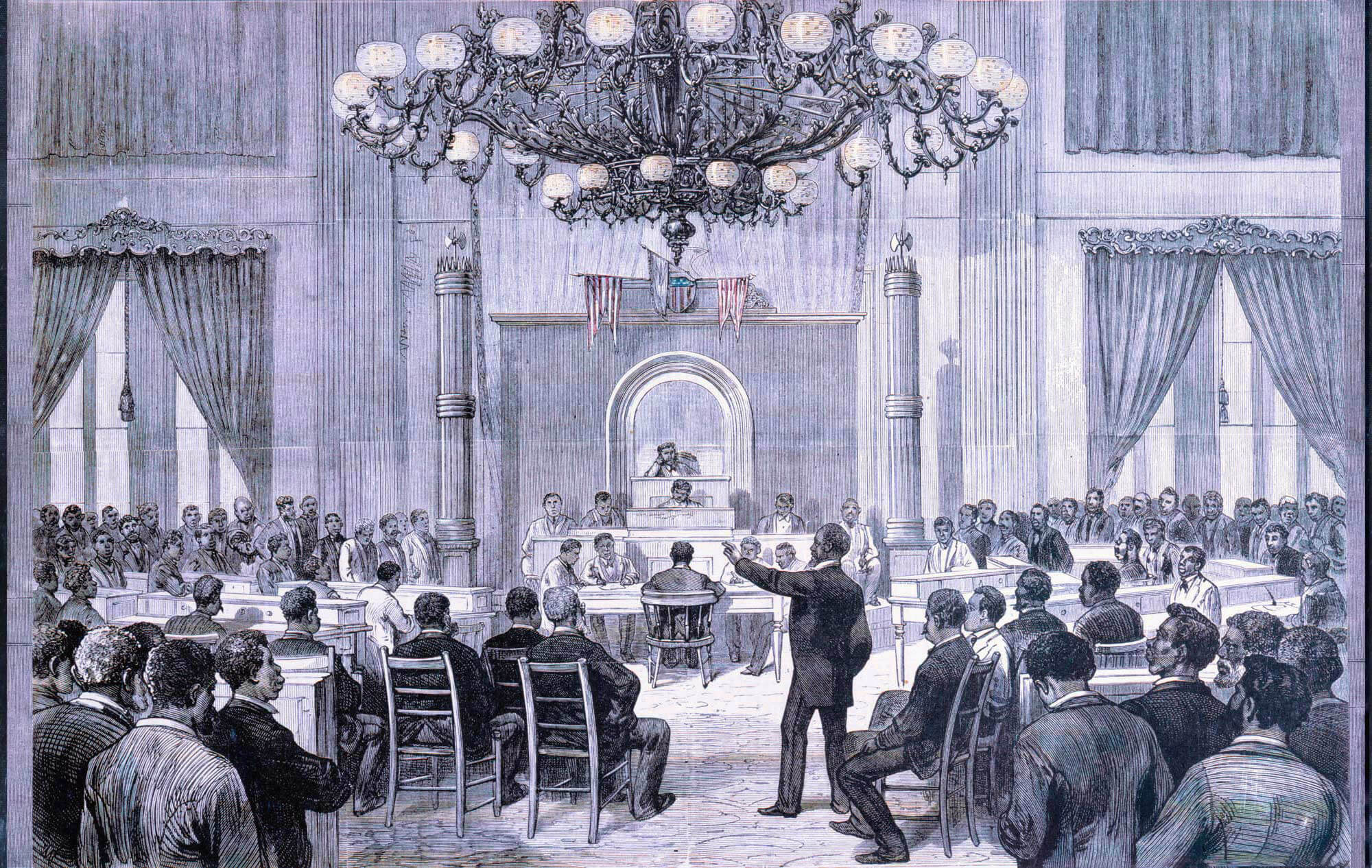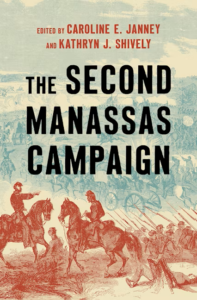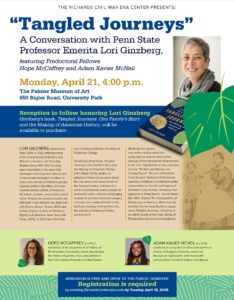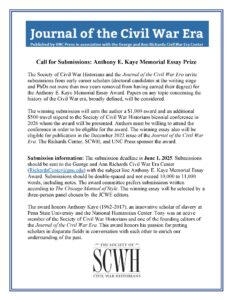
Meet our 2025-2026 pre-doctoral fellows, Alison McCann and Michael Kaelin! Both fellows recently conducted a Q&A with Production and Communications Manager Sheena Carroll, focusing on their dissertations, specialized interests, and fellowship goals.

McCann is a doctoral candidate in the History Department at the University of Miami. Her research focuses on 19th-century American History, emphasizing African American migration, citizenship, and concepts of freedom. Her dissertation, titled “Until Freedom be Done: African American Place Making in Liberia, 1790-1880,” examines the experiences of African Americans who sought to establish lives in Liberia, Africa, as they reconfigured their existence abroad. She highlights specific families who migrated from Southern and Northern regions through her work, articulating a narrative essential to their aspirations and decisions regarding the African outpost.
Carroll: Tell us about your dissertation project and how you see it fitting into the Richards Center’s broad conception of the Civil War Era.
McCann: My dissertation project complements the Richards Center’s broad conception of the Civil War by taking an expansive long-nineteenth-century approach to the Black colonization movement and its Aftermath. In my work, the United States sits at the nexus of the Atlantic world, where many competing ideas of freedom and citizenship are being realized during the Civil War era. While colonization was partly a scheme initiated by the American Colonization Society in 1816, African Americans also harbored ambitions about resettlement in Liberia throughout the nineteenth century. My work focuses specifically on Black emigres from the North and South of the United States who, through direct and indirect ways, challenge the idea of American freedom, slavery, and democracy—but they take their mission abroad to Liberia, Africa. My goal is to show that colonization was an important part of American political and social life both before and after the Civil War, and to highlight how African Americans actively participated in this movement.
Carroll: What new insights or historiographical questions do you hope to explore during your time here?
McCann: During my time at the Richards Center, as I engage with colleagues and workshop ideas, I would like to explore the long-term effects of colonization, the ongoing debates about race, identity, and citizenship, and how these concepts have evolved as historians revisit these histories. Colonization appears to be a subtle aspect of the broader perspective on United States expansionist ambitions, yet it holds significant value for understanding concepts of citizenship and race. Historiographically, it will be interesting to discuss how US imperial histories have treated colonization and shaped how we view the experiences of African Americans abroad, and what that means for historians as we continue these narratives.
A significant portion of my dissertation project explores the refreshing perspective of people involved in this migration movement, namely, the under-documented black settler. Many historians have focused on the American Colonization Society, their agents, and the Black elites of the Liberian colony who have a wealth of sources and some biographies, but the majority left behind a few letters that offer us a glimpse into their experience. Fresh insights on colonization should focus on the everyday settler, those who sometimes got caught up in a colonizing scheme. My work seeks to situate the mass of poor disenfranchised Southern and some Northern African Americans who emigrated to Liberia to understand what colonization meant to them.
Carroll: How do you plan to engage with the Richards Center and the broader Penn State scholarly community during your fellowship year?
McCann: I have got my calendar marked with upcoming roundtables, lectures, book talks, workshops, brown bag lunches, and more. I hope these spaces will be opportunities for me to meet people and become acquainted with the community. I also plan to be present and engaging with colleagues in the history department—some of whose work I have read and am eager to meet. But I would love to interact across disciplines; I have learned so much from scholars in other areas like anthropology and English. I find that having a broad intellectual community not only informs your work but also your thought process, so I hope there are opportunities to meet with others in different departments.
Carroll: What resources are you most looking forward to using?
McCann: I am looking forward to mentorship and the series of professional development workshops. This is an amazing opportunity to get feedback and think through ideas with people who care and understand your work, and I am truly grateful for this experience. Aside from doing the work, being in dialogue about your work is crucial, and this is a significant step for me, being away from my home university, where I get to explore my work with others who do not know me or the research I have done.
Carroll: Looking beyond your dissertation year, how do you envision converting your research into future work?
McCann: I am looking forward to a future book project after the successful defense of the dissertation next year. These five chapters lay some groundwork as I want to explore further the lives of African American settlers in Liberia, and the aftermath of colonization; thus, the Liberian archives would be the next endeavor. I am also seeking more ways to make my work accessible beyond just readership and academic communities. I’m not quite sure if that means a podcast series or a digital humanities project, which I have some experience in, but I want to explore that option later.

Michael Kaelin is a PhD candidate in the Department of History at the University of Wisconsin – Madison. His dissertation, “Selected Lives: Immigrant Community and the Origins of Federal Immigration Policy in New York, 1847-1882,” examines German and Irish American participation in New York State’s Board of Commissioners of Emigration, the body that regulated immigration into New York in the mid-nineteenth century. His work has been supported by the German Historical Institute, the German Society of Pennsylvania, and the Peter Paul Miller Educational Travel Fund.
Carroll: Tell us about your dissertation project and how you see it fitting into the Richards Center’s broad conception of the Civil War Era.
Kaelin: My dissertation [Selected Lives] argues that foreign-born actors centrally shaped the ideology, policies, and procedures of New York’s Board of Commissioners of Emigration, and by extension laid the groundwork for the first federal immigration system. Created in 1847 as a response to the Potato Famine, this ten-member Board was charged with regulating, processing, and aiding new arrivals. The law establishing it guaranteed representation to the presidents of New York’s Irish and German Societies, and a tradition of appointing additional at-large foreign-born members meant that over half of all commissioners during the Board’s existence were immigrants. My dissertation focuses on Irish and German American community advocates and commissioners of Irish and German origin in their negotiations with native-born colleagues, demonstrating that each group championed their own conceptions of “worthiness,” poverty, fitness, and proper comportment. Disagreements on these points led to a productive tension that ultimately resulted in a multiethnic consensus as to the proper standards by which to regulate new immigration. The federal government used the New York system as its institutional blueprint when it assumed control of immigration in 1882, and ensconced Irish and German regulatory priorities in the first national apparatus. Despite technically being a state-level organization, then, the Commissioners were operating what was functionally a national system, and their decisions were informed by their own life experiences that were both intensely local and necessarily transnational. Given that the eventual creation of a federal system was a significant long term outcome of the transformation of state power flowing out of the Civil War era, I consider this a story inextricable from Civil War and Reconstruction politics.
Carroll: What new insights or historiographical questions do you hope to explore during your time here?
Kaelin: In addition to recapturing foreign-born representatives’ roles in the transition to federal control, Selected Lives restores agency to all settled immigrants as potential regulators of further immigration, and challenges migration scholars to take this dynamic seriously as a force shaping individuals’ decisions to migrate, ethnic community life, and state action. Crucially, Irish- and German-born commissioners’ perceptions of worthiness were not merely elite constructions, but instead reflected ideas embraced by their respective communities at large. Using letters, journals, immigrant guidebooks, and transatlantic media located in the United States, Ireland, and Germany, Selected Lives demonstrates that the positions advanced by ethnic commissioners were an institutionalized manifestation of quotidian practices that immigrants from across the socioeconomic spectrum deployed to dissuade “unworthy” individuals from immigrating, and to police the behavior of community members after arrival.
Carroll: How do you plan to engage with the Richards Center and the broader Penn State scholarly community during your fellowship year?
Kaelin: I am particularly excited for the weekly workshops, in which I look forward to learning more about other scholars’ work on a wide range of nineteenth-century topics. I’m also really looking forward to Laura Edwards’s lecture series, as she is a scholar I greatly admire and was one of my favorite professors in undergrad. The professional development series also should be an excellent opportunity to prepare for the next steps in my academic career.
Carroll: What resources are you most looking forward to using?
Kaelin: My dissertation research was originally slated to begin in the summer of 2020, which obviously meant that it did not proceed according to plan. Although most of my research is completed, there are some spots to backfill with additional archival materials that I had to pass over due to logistical constraints. The most significant of those is the Archbishop John Hughes Papers, as well as some smaller collections at the German Society of Pennsylvania and some non-digitized newspaper collections located in archives in New York and Pennsylvania.
Carroll: Looking beyond your dissertation year, how do you envision converting your research into future work?
Kaelin: Materials I encountered while researching this dissertation may serve as the starting point for two potential future projects. The first I tentatively refer to as “ethnic settler colonialism.” My initial work on this topic suggests that rather than simply reinforcing a unified commitment to Manifest Destiny, foreign-born thinkers and politicians articulated different ideological justifications of and ideal practices for westward expansion. In addition to being an intellectual history, this divergence of contemporary opinion also suggests that scholars need to reexamine or qualify existing assumptions about Native-settler relations, whiteness studies, postbellum politics, and settlement and land use patterns. Differing approaches to American expansion created diverging and only partially reconcilable visions of the United States’ future following the Civil War among the country’s three largest white ethnic groups, the full implications of which require further investigation.
The second potential topic would be on the various schemes for settling European immigrants in the postbellum South. German American Commissioners of Emigration in the late 1860s, in particular, seriously explored trying to use their power to redirect immigrants to the South in order to form large free soil communities, believing that this would have a beneficial demographic, economic, and political influence on Reconstruction. Most of these schemes were never even attempted, much less carried out, but they provide an interesting glimpse into another aspect of Northern Reconstruction politics.

The Journal of the Civil War Era is pleased to announce that Dr. J. Jacob Calhoun has been selected as the recipient of the Anthony E. Kaye Memorial Essay Award for 2025. His winning essay is titled, “‘Nothing was known of the dead’: Coroners and the Massacres of 1866.”
The prize committee, consisting of Paul Barba (chair), Erin Mauldin, and Whitney Stewart, praised the article as follows: “By closely and creatively interrogating the records of the coroner’s offices in Memphis and New Orleans in the aftermath of the 1866 massacres, Calhoun reveals the vast power and responsibility vested in these officials and their institutions. Significantly, Calhoun demonstrates in convincing fashion how these men shaped both the government’s investigations of mass racist violence and how historians have interpreted these pivotal moments in Civil War era history. Insightful and meticulous, Calhoun’s essay brings into relief the enduring methodological value of close readings and comparative lenses.”
Calhoun is a Byron K. Trippet Assistant Professor of History and the David A. Moore Chair in American History at Wabash College. He was a Postdoctoral Fellow of the Nau Center for Civil War History 2024-2025, and he received his PhD from the University of Virginia in 2024. His research focuses on the history of emancipation and Reconstruction, specifically the intersection between politics, race, and violence.
The Kaye Award is awarded every two years and is co-sponsored by the JCWE, the Society of Civil War Historians, the University of North Carolina Press, and the George and Ann Richards Civil War Era Center.

Guy Emerson Mount has won the $1,000 George and Ann Richards Prize for the best article published in The Journal of the Civil War Era in 2024. The article, “Shall I Go? Black Colonization in the Pacific, 1840-1914” appeared in the December 2024 special issue, Black Internationalism in the Era of Emancipation, guest edited by Brandon R. Byrd.
The prize committee was impressed by the article’s “innovative approach and its illuminating insights” and praised it for creating “an innovative historical arc that illuminates how white state crafters sought to tackle the problem of emancipation through colonization.” The committee called the article “beautifully written” and predicted that it “will not only offer scholars of slavery, abolition, Reconstruction, and US imperialism a new way to think about the connections between these topics but also fuel further conversation about the place of the Pacific in the histories of nineteenth-century America.”
Mount is an Assistant Professor of History and an affiliate in African American Studies at Wake Forest University. He teaches courses in Atlantic History, Antebellum America, the Civil War and Reconstruction, and the Global History of Reparations. He earned his PhD from the University of Chicago under the direction of Tom Holt. While at Chicago, he co-founded the Reparations at UChicago Working Group which first uncovered the University’s historical ties to slavery while organizing alongside residents of the South Side of Chicago for reparations. Previously he held a Carter G. Woodson fellowship at the University of Virginia and a tenure-track position at Auburn University where he was granted the Outstanding Graduate Mentor Award in 2022. His current book project, from which the winning article is derived, is tentatively titled Black Elsewheres: Slavery, Empire, and Reconstruction in the Black Pacific.
Awarded annually, the Richards Prize celebrates the generosity of George and Ann Richards, who were instrumental in the growth of the Richards Civil War Era Center and in the founding of The Journal of the Civil War Era. The journal is grateful for the service of this year’s prize committee: Joanna Cohen, Queen Mary University of London (chair); Anne Sarah Rubin, University of Maryland, Baltimore County; and Gabriel (Jack) Chin, University of California, Davis School of Law.

This is a one-year appointment with an excellent possibility of renewal for a second year. During their residency, the scholar will primarily perform their research. The scholar will have no teaching or administrative responsibilities. In addition, they will attend workshops, professional development sessions, and other relevant events, and will be expected to take an active part in Penn State’s community of researchers.
A Ph.D. in History or related field is required at time of appointment. Successful applicants must have completed all requirements for the Ph.D. within the previous four academic years.
To be considered for these positions, submit a complete application packet including a cover letter describing your research and goals for the scholarship year, a curriculum vitae, and a list of three references online at Penn State’s Job Posting Board. We will request writing samples and letters of recommendation from candidates who advance in the search process.
Postdoctoral Scholar, Civil War Era
The Richards Civil War Era Center, in conjunction with the Department of History and the College of the Liberal Arts, at The Pennsylvania State University invites applications for a Postdoctoral Scholar in the history of the Civil War Era, with an anticipated start date of July 1, 2026.
All research interests spanning the pre-war period through Reconstruction will receive favorable consideration. Proposals that align with the Richards Center’s interests in slavery, abolition, and emancipation are especially welcome.
Postdoctoral Scholar, African American History
The Richards Civil War Era Center and the Africana Research Center at The Pennsylvania State University, University Park, PA, invite applications for a Postdoctoral Scholar in African American History, with an anticipated start date of July 1, 2026.
All research interests spanning the origins of slavery through the Civil Rights movement will receive favorable consideration. Proposals that align with the Richards Center’s interests in slavery, abolition, and emancipation, as well as comparative or Atlantic history, are especially welcome.

UNC Press has published The Second Manassas Campaign, co-edited by 2024-2025 Richards Center Persun Visiting Scholar KT Shively.
The Second Manassas Campaign contains essays that contextualizes the military campaign’s political dimensions, logistics, aftermath, and more. Shively co-edited the volume with Caroline E. Janney.
Kathryn “KT” Shively is an associate professor of Civil War and Reconstruction history at Virginia Commonwealth University with specialties in early American military, environmental, and medical history. They are the author of Nature’s Civil War: Common Soldiers and the Environment in 1862 Virginia (UNC Press, 2013) and co-editor with Caroline Janney of The Second Manassas Campaign (UNC Press, 2025). They also serve as co-PI with Paul Quigley (Virginia Tech) on the NEH-funded public history project, “Experiencing Civil War History Through Augmented Reality: Soldiers, Civilians, and the Environment at Pamplin Historical Park.” Their second monograph, History Wars: Jubal A. Early and the Confederate Origins of Modern American History, is under contract with University of Georgia Press for submission in 2025. Their favorite part of being a Civil War historian is giving battlefield tours, and they spend their non-working hours hosting bluegrass jams, making pies, hiking, and reading with their kid.

The Richards Center is thrilled to announce that Ryan Quintana will be the 2025-26 Persun Visiting Scholar! This is the second year of the Mark and Ann Persun Visiting Scholars program for tenured faculty in history at the rank of associate professor. More information about the program, which supports scholars of Civil War era military or political history to develop a book-length work-in-progress, can be found on our program details page.
Ryan Quintana is an associate professor of 19th Century American History at Wellesley College with specialties in the history of political development and the state, slavery and emancipation, and the production of space. He is the author of Making a Slave State: Political Development in Early South Carolina (University of North Carolina Press, 2018). He is currently working on his second book project, “We Do Not Want to Be Slaves”: Empire and Expansion in the Age of Emancipation, which examines the everyday labors and governing practices of empire and infrastructural development in the North American West during the Civil War Era. When he’s not in the archives or the classroom, he enjoys working in his garden, riding his bike, and hoping that Manchester United will somehow turn it all around.

Join the Richards Center on Monday, April 21, at 4:00 p.m., for a conversation with Lori Ginzberg and postdoctoral fellows Hope McCaffrey and Adam Xavier McNeil about Ginzberg’s latest book, Tangled Journeys: One Family’s Story and the Making of American History (UNC Press, 2024). The event will be held at the Palmer Museum of Art and followed by a reception.
To attend, please register by emailing RichardsCenter@psu.edu by Tuesday, April 15, 2025.
Lori Ginzberg retired from Penn State in 2022 after teaching in the Departments of History and Women’s, Gender, and Sexuality Studies since 1987. She has long been interested in the ways that ideologies about gender obscure the material and ideological realities of class, how women of different groups express political identities, and how commonsense notions of American life shape, contain, and control radical ideas. Among her previous books are Elizabeth Cady Stanton: An American Life (Farrar, Straus, Giroux, 2009) and Untidy Origins: A Story of Woman’s Rights in Antebellum New York (UNC Press, 2005). In 2023 and 2024 she was a visiting professor of history at Haverford College.
Ginzberg’s latest book, Tangled Journeys: One Family’s Story and the Making of American History (UNC Press, 2024), relates an ambitious historical narrative about the ancestors and descendants of the Sanders family—children of a white Charlestonian and a woman he enslaved—while explicitly challenging readers to confront what was unseen, unheard, and undocumented in the archives, thereby inviting them into the process of American history making itself.
Ginzberg has spoken and written widely about the centennial commemoration of the passage of the Nineteenth Amendment to the U.S. Constitution. A few examples include “‘All Men and Women are Created Equal:’ The Life of Elizabeth Cady Stanton” (National Park Service website), a National Constitution Center conversation on the life and legacy of Elizabeth Cady Stanton. Ginzberg also appeared in Penn State’s “HumIn focus” film, Who Counts: The Complexities of Democracy in America. More recently she has had the opportunity to speak about Tangled Journeys, including at an author event at the Free Library of Philadelphia and on several podcasts.

The Society of Civil War Historians and the Journal of the Civil War Era invite submissions from early career scholars (doctoral candidates at the writing stage and PhDs not more than two years removed from having earned their degree) for the Anthony E. Kaye Memorial Essay Award. Papers on any topic concerning the history of the Civil War era, broadly defined, will be considered.
The winning submission will earn the author a $1,000 award and an additional $500 travel stipend to the Society of Civil War Historians biennial conference in 2026 where the award will be presented. Authors must be willing to attend the conference in order to be eligible for the award. The winning essay also will be eligible for publication in a future issue of the Journal of the Civil War Era. The Richards Center, SCWH, and UNC Press sponsor the award.
Submission information: The submission deadline is June 1, 2025. Submissions should be sent to the George and Ann Richards Civil War Era Center (RichardsCenter@psu.edu) with the subject line Anthony E. Kaye Memorial Essay Award. Submissions should be double-spaced and not exceed 10,000 to 11,000 words, including notes. The award committee prefers submissions written according to The Chicago Manual of Style. The winning essay will be selected by a three-person panel chosen by the JCWE editors.
The award honors Anthony Kaye (1962–2017), an innovative scholar of slavery at Penn State University and the National Humanities Center. Tony was an active member of the Society of Civil War Historians and one of the founding editors of the Journal of the Civil War Era. This award honors his passion for putting scholars in disparate fields in conversation with each other to enrich our understanding of the past.

The Richards Center at Penn State and The Journal of the Civil War Era (JCWE) announce a journal
article workshop for advanced graduate students, recent PhDs, assistant professors, and independent
scholars. Selected scholars will provide a draft journal article by August 15, 2025, and
participate in an online workshop in September. The workshop will be facilitated by a senior
historian in the field, and the aim is to assist scholars in crafting a publishable article.
Although the workshop is cosponsored by the JCWE, participants are not obliged to submit articles
there.
Deadline for applications: April 1, 2025
To apply for the program, please submit the following materials as one pdf file to RichardsCenter@psu.edu.
1) Your C.V.
2) A proposal that includes title and brief (500-word) synopsis of the proposed article; explanation of where the piece currently stands and what kind of advice you would find most helpful.

The Richards Civil War Era Center, in the College of the Liberal Arts, Penn State, invites applications for two 2025-26 predoctoral dissertation fellowships in the history of the Civil War Era.
The Richards Center conceives of the Civil War Era broadly. We especially welcome projects related to the history of slavery, emancipation, and their legacies and the history of struggles for freedom and democracy in the United States. This is a limited-term (one-year) fellowship for advanced graduate students who are in the writing stage of their dissertation. During their residency, the fellows will primarily perform their research; they will have no teaching or administrative responsibilities. The fellows will be expected to make progress on their dissertation and to take an active part in the Richards Center and Penn State’s community of researchers.
For more information, visit the Predoctoral Fellowship Program webpage.